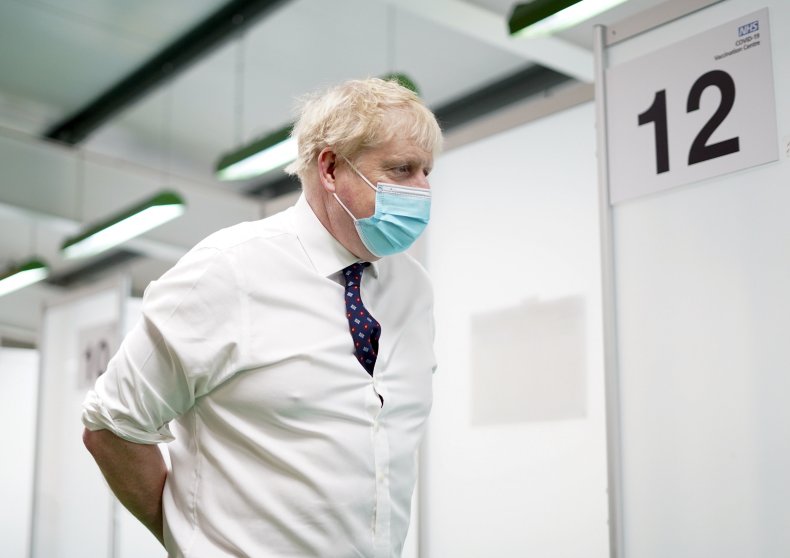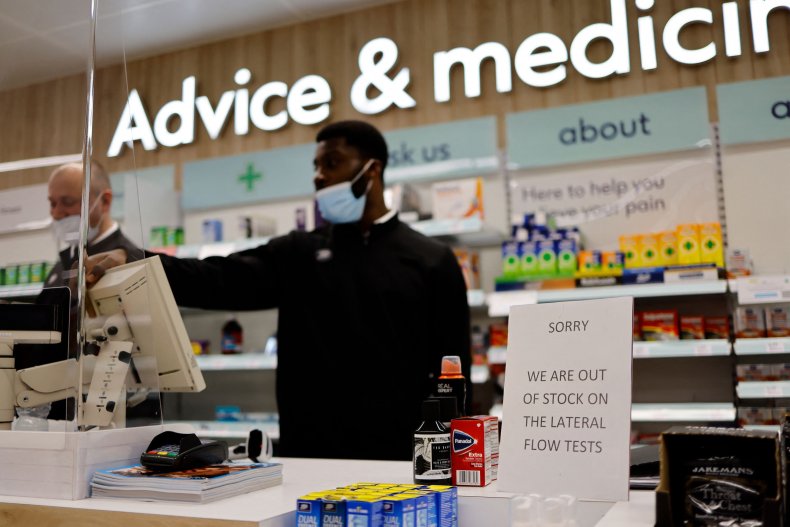Some students in the U.K. will be required to wear face masks when returning to school after the holiday break as the highly contagious Omicron coronavirus variant spurs soaring infection rates.
Secondary school students in England will be subject to the mask mandate, and may also see their classes merged with others amid a shortage in staff.
On Sunday alone, Britain and Wales reported 137,583 new infections and 73 new deaths. COVID-19 data for fellow U.K. members Scotland and Northern Ireland were planned to be announced after the holiday weekend.
The British government vowed to hastily send ventilation units and COVID-19 testing kits to schools to help make sure that they can soon reopen. As for the school mask requirement, Prime Minister Boris Johnson said that while he isn't a fan of the measure, it is aimed at curbing the spread of the virus among students.
"We don't want to keep them. I don't like the idea of having face masks in [the] classroom any more than anybody else does, but we won't keep them on a day more than is necessary," he said.

British Education Secretary Nadhim Zahawi told Sky News: "The priority is to keep schools open."
He said testing, ventilation and other measures being put in place would "make a big difference to schools this year."
Patrick Roach, general secretary of the British teachers' union NASUWT, welcomed the news that more ventilation units and testing kits would be available but warned Sunday that the education industry has another pressing problem as schools prepare to reopen.
"The availability of teachers and support staff is also a key pressure point for schools this term as the number of COVID cases continue to increase," Roach said.
Zahawi addressed the issue Monday, saying the government continues to monitor staff absences amid the pandemic. He told Sky that absenteeism was around eight percent last year. "If that rises further then we look at things like merging classes, teaching in bigger numbers," he said.
Across Europe, schools were reopening or preparing for another new term overshadowed by the global pandemic.
Children returned to class on Monday in several parts of Germany, where patchy testing and reporting over the holiday period means that the level of infections was somewhat uncertain.
In Berlin, one of the states where schools reopened, the local education minister said daily testing for children will be carried out this week. But Astrid-Sabine Busse told RBB Inforadio that current plans call for that to be reduced to three tests per week after that.
Testing "is already an absolute routine at school, before classes, and we want to keep it," she said.
In the eastern state of Thuringia, which had Germany's highest infection rate in recent weeks, children will start off the new term learning from home for at least two days. From Wednesday onward, schools will decide themselves whether to stick to online learning, bring children back to the classroom or work with a mixture of the two.
Over 12 million French children returned to school Monday, with new rules aimed at slowing the spread of the virus. French children from the age of six have been required to wear a face mask in classrooms since November.
If a child tests positive, all other children in the same class must test negative three times in the next four days to stay at school. The first antigen or PCR test must be performed by a health professional, followed by self-tests every two days, which are to be provided for free by pharmacies.
The move comes amid record-high infection numbers fueled by the Omicron variant, prompting a massive demand for self-tests across the country.
Pharmacists expressed concerns Monday over possible shortages caused by the new testing regime unveiled on Sunday.
The government is also encouraging local authorities, in charge of financing public schools, to buy carbon dioxide monitors which provide an alert when classrooms need to get ventilated.
Italian schools are not scheduled to reopen until next week, but already local leaders are mulling possible delays given the surge in cases in Italy.
The governor of southern Campania, Vincenzo De Luca, suggested Monday that a 20-30 day delay to the resumption of in-person schooling would allow for the next peak in cases - expected by the end of this month - to pass while giving more time to increase vaccinations among students.
"It isn't an ideal measure but it would allow us to resume in-person lessons quickly, with greater serenity for students, families and school staff," De Luca said. It wasn't immediately clear if his suggestion was a trial balloon or a real proposal.
Caretaker Dutch Education Minister Arie Slob said Monday that elementary and high school children will be allowed back to classrooms next Monday after a holiday that was extended to three weeks as part of a nationwide lockdown that is set to continue until Jan. 14.
The Associated Press contributed to this report.


Post a Comment